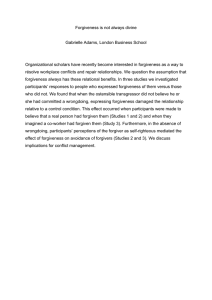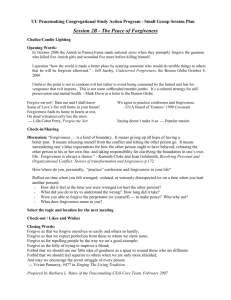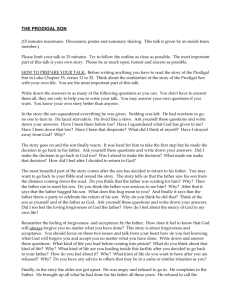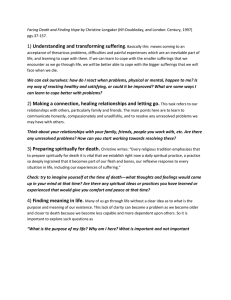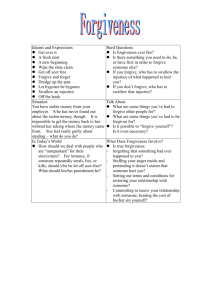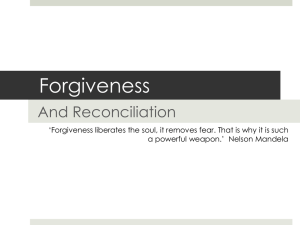The Role of Forgiveness in Mediating Feelings of Betrayal within... Adult Romantic Relationships Bailey Patton Faculty: Douglas Crews, PhD, MSW, M. Div.
advertisement
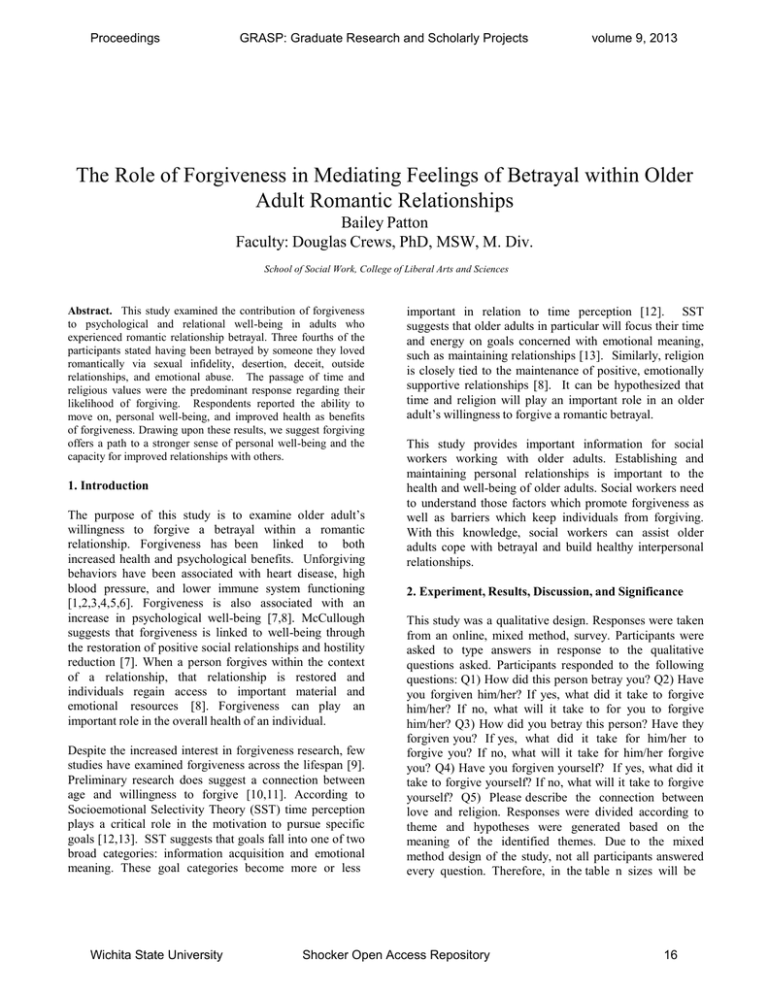
Proceedings GRASP: Graduate Research and Scholarly Projects volume 9, 2013 The Role of Forgiveness in Mediating Feelings of Betrayal within Older Adult Romantic Relationships Bailey Patton Faculty: Douglas Crews, PhD, MSW, M. Div. School of Social Work, College of Liberal Arts and Sciences Abstract. This study examined the contribution of forgiveness to psychological and relational well-being in adults who experienced romantic relationship betrayal. Three fourths of the participants stated having been betrayed by someone they loved romantically via sexual infidelity, desertion, deceit, outside relationships, and emotional abuse. The passage of time and religious values were the predominant response regarding their likelihood of forgiving. Respondents reported the ability to move on, personal well-being, and improved health as benefits of forgiveness. Drawing upon these results, we suggest forgiving offers a path to a stronger sense of personal well-being and the capacity for improved relationships with others. 1. Introduction The purpose of this study is to examine older adult’s willingness to forgive a betrayal within a romantic relationship. Forgiveness has been linked to both increased health and psychological benefits. Unforgiving behaviors have been associated with heart disease, high blood pressure, and lower immune system functioning [1,2,3,4,5,6]. Forgiveness is also associated with an increase in psychological well-being [7,8]. McCullough suggests that forgiveness is linked to well-being through the restoration of positive social relationships and hostility reduction [7]. When a person forgives within the context of a relationship, that relationship is restored and individuals regain access to important material and emotional resources [8]. Forgiveness can play an important role in the overall health of an individual. Despite the increased interest in forgiveness research, few studies have examined forgiveness across the lifespan [9]. Preliminary research does suggest a connection between age and willingness to forgive [10,11]. According to Socioemotional Selectivity Theory (SST) time perception plays a critical role in the motivation to pursue specific goals [12,13]. SST suggests that goals fall into one of two broad categories: information acquisition and emotional meaning. These goal categories become more or less Wichita State University important in relation to time perception [12]. SST suggests that older adults in particular will focus their time and energy on goals concerned with emotional meaning, such as maintaining relationships [13]. Similarly, religion is closely tied to the maintenance of positive, emotionally supportive relationships [8]. It can be hypothesized that time and religion will play an important role in an older adult’s willingness to forgive a romantic betrayal. This study provides important information for social workers working with older adults. Establishing and maintaining personal relationships is important to the health and well-being of older adults. Social workers need to understand those factors which promote forgiveness as well as barriers which keep individuals from forgiving. With this knowledge, social workers can assist older adults cope with betrayal and build healthy interpersonal relationships. 2. Experiment, Results, Discussion, and Significance This study was a qualitative design. Responses were taken from an online, mixed method, survey. Participants were asked to type answers in response to the qualitative questions asked. Participants responded to the following questions: Q1) How did this person betray you? Q2) Have you forgiven him/her? If yes, what did it take to forgive him/her? If no, what will it take to for you to forgive him/her? Q3) How did you betray this person? Have they forgiven you? If yes, what did it take for him/her to forgive you? If no, what will it take for him/her forgive you? Q4) Have you forgiven yourself? If yes, what did it take to forgive yourself? If no, what will it take to forgive yourself? Q5) Please describe the connection between love and religion. Responses were divided according to theme and hypotheses were generated based on the meaning of the identified themes. Due to the mixed method design of the study, not all participants answered every question. Therefore, in the table n sizes will be Shocker Open Access Repository 16 Proceedings GRASP: Graduate Research and Scholarly Projects volume 9, 2013 different based on the number of responses to that specific question. Table: 1 Question Response Results Question Have you ever been betrayed by someone you loved romantically? Have you forgiven? Have you ever betrayed someone you have loved romantically? Have they forgiven? Does love have religious meaning to you? % Yes 72% % No 28% 77% 38% 23% 62% 69% 46% 31% 54% *Table includes summary of questions due to space. kind of relationship and forgiveness.” However, older adults who were able to forgive experienced increased sense of personal well-being and improved interpersonal relationships. As one participant noted; “It wasn't worth the emotional roller coaster I was on. Life is easier when you don't walk around mad all the time.” 4. Acknowledgements I would like to thank Amanda Barusch for sharing her expertise in the area of aging and forgiveness. I would also like to thank Jessica Whitley and Traci Nigg for their assistance in coding data. 3. Conclusions In this study, older adults predominately attributed forgiveness to time and religious values. These findings support the hypotheses based on SST theory. Specifically, time perception plays a critical role in the motivation to pursue emotionally satisfying goals [12,13]. Religion is also closely linked to an individual’s desire to find meaning and emotional satisfaction [8]. As time passed, older adults explained that they were able to reflect on the betrayal and put the hurt into perspective. As one individual said, “Time was so vital. I needed time to heal, but as I grew as a person, I didn't need to know why he cheated I just accepted that our relationship was not meant to be. Don't get me wrong, it was tough at first, but this acceptance has come after about 5 years.” Additionally, religious values significantly impacted older adult’s willingness to forgive. Older adults drew on religion and spirituality for strength when forgiving their betrayer. One individual explained, “The key was letting go and moving on in my life. I had to learn to trust others again. This was a very slow process. I attribute all of it to my relationship to God for assistance during this time of personal trial.” Forgiveness was also seen as a part of practicing their faith. One individual noted, “God says forgive the people who trespass against you.” It is important to note that some individuals did not forgive their betrayer and felt no compulsion to do so. For some, the betrayal was too great and they felt that forgiveness was not deserved. One participant explained, “There is nothing this person could do for me to forgive him. Cheating, lying, and hurting one's family are the ultimate betrayals and are definite deal breakers for any Wichita State University [1]Allan, R., & Scheidt, S. (1996). Empirical basis for cardiac psychology. In R. Allan & S. Scheidt (Eds.), Heart and mind (pp. 63-124). Washington, DC: American Psycho-logical Association. [2]McEwen, B.S., & Stellar, E. (1993). Stress and the individual: Mechanisms leading to disease. Archives of Internal Medicine, 153, 2093-2101. [3] Schwenkmezger, P., & Hank, P. (1996). Anger expression and blood pressure. In CD. Spielberger & I.G. Sarason (Eds.), Stress and emotion: Anxiety, anger, and curiosity (Vol. 16, pp. 241-259). Washington, DC: Taylor & Francis. [4] Thoresen, C., Harris, A., & Luskin, F. (2000). Forgiveness and health: An unanswered question. In M.E. McCullough, K.I. Pargament, & C.E. Thoresen (Eds.), Forgiveness: Theory, research, and practice (pp. 254-280). New York: Guilford Press. [5] Williams, R.., & Williams, V. (1993). Anger kills: Seventeen strategies for controlling the hostility that can harm your health. New York: Harper Perennial. [6] Witvliet, C., Ludgwig, T. & Vander Laan, K. (2001). Granting forgiveness or harboring grudges: implications for emotion, physiology, and health. Psychological Science, 12(2), 117132. [7] McCullough, M., Paragment, K., & Thoresen, C. (2000). The Psychology of Forgiveness: History, Conceptual Issues, and Overview. In M.E. McCullough, K.I. Pargament, & C.E. Thoresen (Eds.), Forgiveness: Theory, research, and practice (pp. 1-14). New York: Guilford Press. [8] McCullough, M., Bono, G. & Root, L. (2005). Religion and forgiveness. In R. Paloutizian & C. Park (Eds.), Handbook of the psychology of religion and spirituality (pp. 394-411). New York, NY: The Guilford Press. [9] Cheng, S. & Yim, Y. (2008). Age difference in forgiveness: The role of future time perspective. Psychology and Aging, 23(3), 676-680. [10] Steiner, M., Allemand, M. & McCullough, M. (2011). Age Differences in Forgiveness: The Role of Transgression Frequency and Intensity. Journal of Research Personality, 45(2011), 670-678. [11] Girard, M. & Mullet, E. (1997). Forgiveness in adolescents, young, middle-aged, and older adults. Journal of Adult Development, 4(4), 209-220. [12] Carstensen, L., Issacowitz, D. & Charles, S. (1999). Taking time seriously: A theory of socioemotional selectiviy. American Psychologist, 54(3), 165-181. [13] Carstensen, L. (1995). Evidence for a life-span theory of sociemotional selectivity. Current Directions in Science, 4(5), 151-156. Shocker Open Access Repository 17
